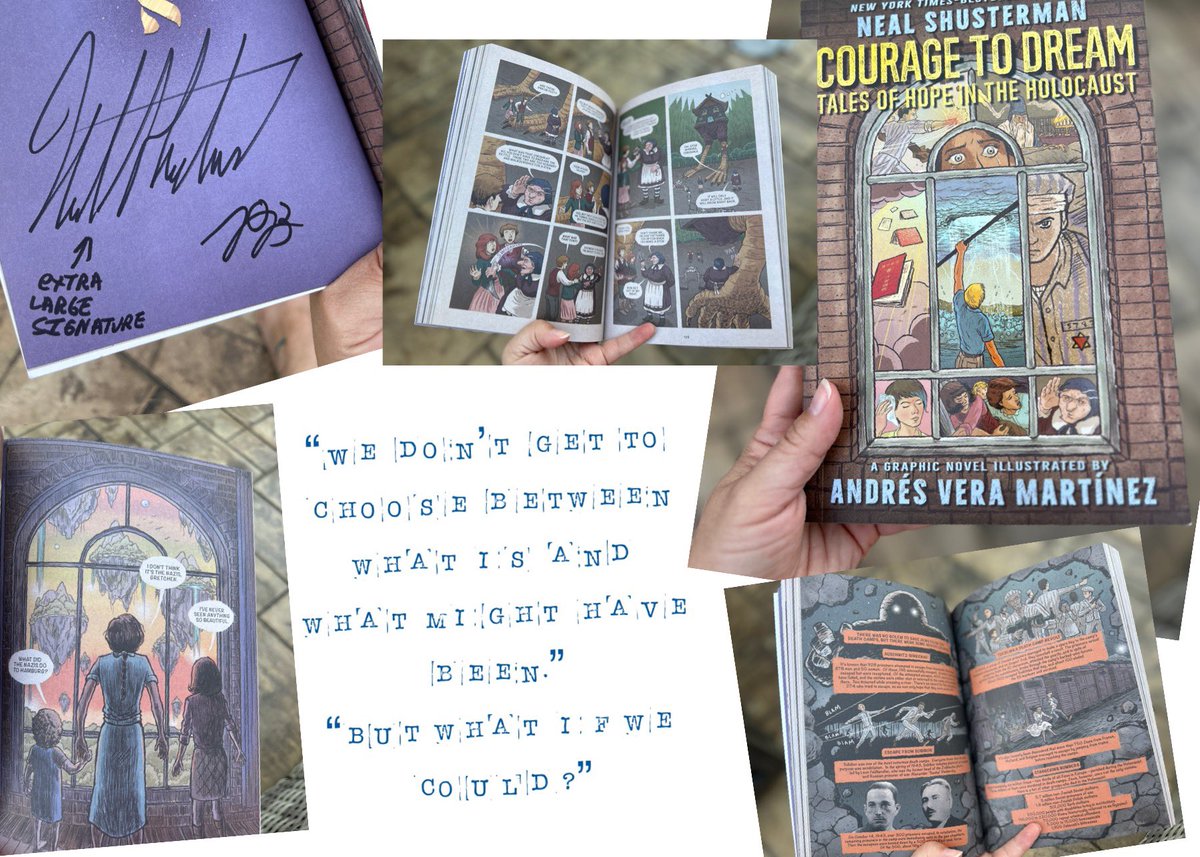Courage to Dream: Tales of Hope in the Holocaust by Neal Shusterman with illustrations by Andrés Vera Martínez; New York: Graphix imprint of Scholastic Inc; © 2023; ISBN 9780545-313483; 245 pages plus after-words by author and illustrator, acknowledgements, and bibliography, $14.99.
This collection of five graphic stories was released on Halloween, October 31, not coincidentally. Each fictional tale has elements of the supernatural, mostly intervening on behalf of Jews who otherwise would have been murdered by the Nazis in the Holocaust.
In an afterword to the anthology, Shusterman writes: “The very concept of fantasy stories with a Holocaust theme felt both exciting and uncomfortable to me. Where is the intersection of fantasy and the grim reality of murdered millions? But the more I thought about it, the more I realized there were powerful stories to tell. There are stories of wish fulfillment, where the tragedy lies in the fact that they can never be fulfilled. And there are stories we’ve told over the ages that bridge the gap between folklore and harsh reality, to help save us – stories with magical beings and mystical objects that stand as metaphors for hope, survival, and collective grief.”
The first story, “He [God] Opens a Window” tells of three Jewish children in hiding in an apartment building who hesitate whether to open the drapes lest they be seen by passing Nazis or their sympathizers. Nevertheless, they cannot contain their curiosity to see what is outside. Each time they look, the view is different and magical. If the Nazis do come for them, the magic window may be a portal to escape and a better life.
The second story, “The Golem of Auschwitz,” tells of a being formed from the ashes of cremated prisoners, Golem like, who wreaks revenge on the Nazi guards at the Auschwitz-Birkenau concentration camp complex. It’s easy to imagine that many Jews who perished in the death camps fervently wished a golem would come to their rescue like the legendary one created in the 16th century by Rabbi Judah Loew to protect the citizens of Prague.
The third story, “Spirits of Resistance,” tells of children who escaped a transport, run into the woods where they join partisans fighting the Nazis. However, these are the woods where Baba Yaga, a witch of Jewish folklore, also lives. Normally, she eats children. When she learns that Nazis kill children, not to eat them, but just because they are Jewish, she is offended, and decides to use her magical powers to help the partisans defeat the Nazi troops who are marching into her forest. In this fantasy, the “wise men of Chelm,” simple town folks who always draw the wrong conclusions, make a cameo appearance.
The fourth story, “Exødus,” tells of the rescue of Denmark’s Jews prior to a planned roundup by the Nazis. Fishermen and other boaters ferry them to neutral Sweden. In this story, a curtain rod in a Jewish family’s apartment is transformed into the staff of Moses, with which its bearer can smite the Nazis and raise sunken ships from the sea bottom to help transport the Jews to safety.
The final story, “The Untold,” imagines a dying grandmother giving a magical seashell to her granddaughter. When she holds it to her ear, the world transforms to what it might have been if the Holocaust had never occurred. The girl suddenly has cousins that she never knew before; there was no such nation as Israel, just British mandatory Palestine; and antisemitism was growing alarmingly in the United States, with the 4th of July bringing out “super-patriot” antisemites. A sobering prospect indeed.
Cartoonist Andrés Vera Martínez said as a Native American Spanish artist from Texas, he found similarities between the prejudice and lynchings his people faced, and the horrors and murders suffered by Jews in the Holocaust. Adding to his interest in collaborating with Shusterman was the fact that Stan Lee and Jack Kirby, the Jewish creators of the Marvel Universe, were his real-life heroes. “I do my best to channel the superpowers of Stan Lee and Jack Kirby in every project,” he wrote.
The stories are intended for readers in Grade 7 and up. I think they will find them fascinating.
Republished from San Diego Jewish World


























